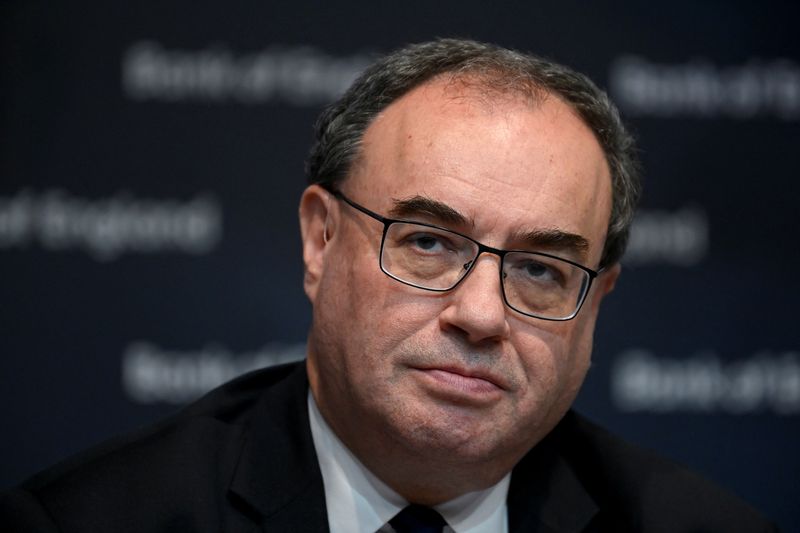LONDON (Reuters) - Bank of England Governor Andrew Bailey and other top officials from the British central bank spoke to lawmakers in parliament on Wednesday, two weeks after the BoE raised interest rates by the most since 1989 to tackle inflation.
Below are quotes from Bailey and his colleagues from the Monetary Policy Committee (MPC) in a question-and-answer session with parliament's Treasury Committee.
BAILEY ON NOT TAKING A PAY RISE:
"I'm not going to take a pay rise. It's not for me to decide but if I were offered one, I will not accept it and I will politely decline as I have before."
BAILEY ON THE LABOUR MARKET:
"It is still a very tight labour market ... the reason that we've said it is likely that we will be increasing interest rates further is that risk, not withstanding the fact that the central case has inflation coming down rapidly."
BAILEY ON UK RISK PREMIUM:
"Let's be honest, there was something of a UK risk premium built into the markets."
Asked how much the UK risk premium is today, he said: "Hard to tell but I would say in the markets, most of it has come out. It's not probably back to zero."
BAILEY ON IMPACT OF SEPT. 23 'MINI-BUDGET':
"We have damaged our reputation internationally ... it will take longer to rebuild that reputation than it will do to correct the gilt curve."
BAILEY ON GLOBAL COMPETITIVENESS:
"Part of competitiveness is having an effective legal system, and part of it is having an effective regulatory system ... we must not threaten that."
BAILEY ON SUPPLY SHOCKS:
"What we have had since then (the pandemic) is a series of supply shocks, essentially, in the UK economy, which have reduced the ... supply capacity of the UK economy relative to demand."
"There was a supply chain shock in the recovery from Covid ... We are now seeing the evidence of that shock is coming off."
BAILEY ON INFLATION:
"The core goods numbers do seem to be now beginning to come off."
BAILEY ON COLLAPSE OF CRYPTO EXCHANGE FTX:
"I don't ... detect what I would call a systemic fallout from FTX."
"Its activity in the UK as far as I am aware is not very substantial."
MPC MEMBER CATHERINE MANN ON POLICY TIGHTENING:
"I also put a very high weight on research that has tended to find that under conditions of inflation uncertainties ... that front-loaded policy tightening is more likely to achieve an outcome that is better controlling of inflation."
MPC MEMBER SWATI DHINGRA ON OVER-TIGHTENING:
"You could think of getting into a much deeper, much longer recession if rates continue to rise because there is already about a fairly sizeable chunk of the previous rate rises that have got to take effect in terms of what they do to GDP."
"There is a risk of over-tightening, and that's the thing I am worried about at this point."
DHINGRA ON POST-BREXIT TRADE:

"It's undeniable now that we're seeing much, much bigger slowdown in trade in the UK compared to the rest of the world."
"There's also the services exports side ... there again, we're seeing a really strong stagnation. We're definitely performing below trend in terms of the exports numbers, in terms of the imports, even probably a bit bigger than that."